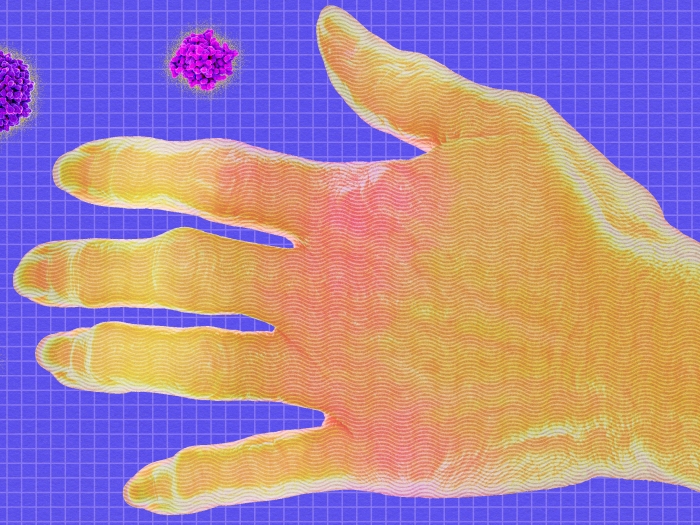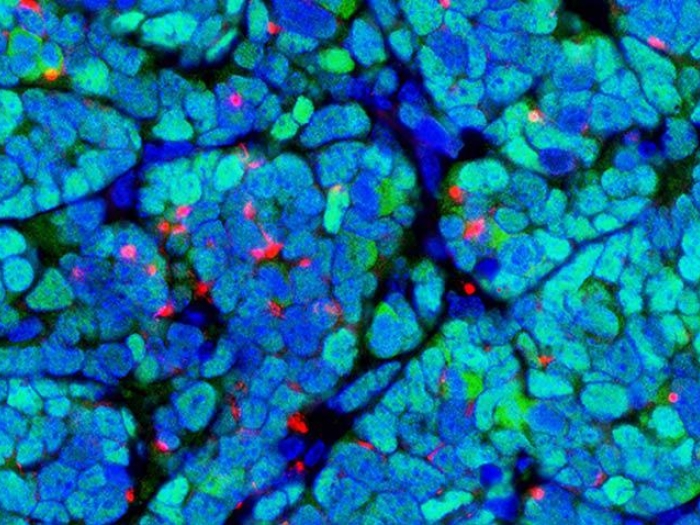In this episode, dermatologist Frank Wang, M.D. joins us to answer the most commonly searched questions about eczema, including:
- What is eczema?
- Are there different types of eczema?
- What is the difference between eczema and psoriasis?
- Is eczema contagious? Can it spread from one part of your body to another?
- Is eczema genetic? Does eczema run in families?
- Does stress cause eczema?
- What can cause an eczema flare up?
- How can you avoid an eczema flare up?
- Are over the counter or home treatments for eczema safe?
- Do bleach baths help eczema?
More resources
- View Dr. Frank Wang’s profile
- Learn more about eczema care at U-M Health
- Learn about dermatology at U-M Health
Transcript
Dr. Malani (00:01):
Dry itchy, scaly patches, relentless itching. One in 10 people will develop eczema at some point during their lifetime. It's uncomfortable and it can be embarrassing, but you don't have to suffer alone. Today we're talking to Dr. Frank Wang. Dr. Wang is a board certified dermatologist
at University of Michigan Health. His practice sees patients with general skin conditions such as eczema and psoriasis, and his research is on aging skin. Eczema can be a lot of things, but it doesn't have to feel like a mystery anymore. I'm Dr. Malani, thank you for joining us on the Michigan Answers podcast. Hi, Dr. Wang. Thanks for joining us today.
Dr. Frank Wang (00:44):
It's a pleasure, Dr. Malani. Thanks for having me.
Dr. Malani (00:46):
So our team has scoured the internet and pulled together a list of the most searched questions about eczema. I'm going to walk you through a handful of the most common ones, and well we hope you're going to have all the answers.
Dr. Wang (00:58):
I'll try my best.
Dr. Malani (00:59):
Great. So let's get started. Number one, what is eczema and what are the different types of eczema?
Dr. Wang (01:05):
So when most people mention eczema, typically they're referring to atopic dermatitis, which is a specific type of eczema. This is a condition that tends to occur in children and manifests as itchy, scaly red patches on the extremities and also the face. But eczema actually refers to a larger group of conditions that not only includes atopic dermatitis, but also conditions such as nummular eczema, hand eczema or dyshidrotic eczema, asteatotic eczema. These are different forms of eczema and again, atopic dermatitis is a common type of eczema usually occurring in children, oftentimes associated with things like asthma, food allergies, seasonal allergies and so on.
Dr. Malani (02:06):
What's the difference between eczema and psoriasis? I know they get lumped together a lot.
Dr. Wang (02:10):
Yeah. Great question. So eczema, as I mentioned, tends to start in childhood. It does tend to get better for most people as they age. Again, it is associated with a number of conditions, food allergies, asthma, seasonal allergies. It tends to be more itchy, less well defined, meaning it has fuzzy borders. It tends to occur in different locations.
Dr. Wang (02:43):
For instance, in many children, it tends to occur on the face and the creases of the elbows and knees. Now psoriasis tends to look a little different. It has more well defined edges, tends to be thicker, perhaps a little less scaly. We don't see it as much in children. It tends to occur in, for instance, adults in their twenties most commonly. Tends to occur on the elbows and knees, for instance, as well as the scalp and lower back. It doesn't tend to have some of those associations like asthma and seasonal allergies that I mentioned for atopic dermatitis.
Dr. Malani (03:31):
Is eczema contagious and can it spread from one part of your body to another?
Dr. Wang (03:36):
Yeah, that's a great question. It's a question that many patients will ask us. So it is not a contagious condition, so you can't spread it to other individuals. However, if you do have eczema, it is possible to spread it to other areas of your body. So for instance, if you have an area that's dry and perhaps itchy and you begin to scratch, that can actually cause eczema to come up. So we often call eczema the itch that rashes. So again, if you scratch a lot, you could spread eczema.
Dr. Malani (04:12):
Is eczema genetic?
Dr. Wang (04:14):
Also a great question. So for many individuals, not everyone, it is. So oftentimes when we are considering the diagnosis of eczema specifically again atopic dermatitis, we often ask is there a family history of eczema? Is there a family history of things like asthma, seasonal allergies, food allergies, things like that.
Dr. Wang (04:39):
We have found that in a subset of individuals, they can have some genetic variations that compromise the barrier function of the skin. In other words, make the skin more dry that can predispose to having eczema, but there are many forms of eczema that also are not genetic.
Dr. Malani (04:59):
Does stress cause eczema?
Dr. Wang (05:01):
So that's a common question that a lot of patients ask us and I would say probably the easiest response or the easiest answer to that is that no, it doesn't cause eczema, but it can certainly worsen eczema. So in fact, stress can worsen just about every skin condition, whether it's acne or psoriasis. Similarly, eczema can be worsened, exacerbated by stress. Stress could even cause an eczema flare. But I would say that stress really doesn't directly cause eczema however.
Dr. Malani (05:38):
So what else can cause an eczema flare and can you avoid one?
Dr. Wang (05:43):
So the most common reasons for eczema flareups are patients who aren't able to care for their skin in a way that maintains moisturization. So for instance, oftentimes I will tell patients that it's important to use a gentle cleanser, a gentle soap in the shower. I don't get paid by any
pharmaceutical companies or anything like that, but an example of a good soap would be Dove bar soap for sensitive skin. Also to avoid long hot showers and to try to moisturize right after coming out of the shower.
Dr. Wang (06:27):
So if patients aren't able to use gentle soaps and they do take hot showers and they do, for instance, use things like loofahs or scrubby things in the shower and don't moisturize, all of that can contribute to causing eczema. Certainly, as I mentioned, scratching as well can cause an eczema flare, even infections on the skin can cause a flare up of eczema.
Dr. Malani (06:54):
So can you treat eczema on your own and if so, when is it time to see a specialist?
Dr. Wang (06:59):
So I would say that if you have mild eczema, you can certainly treat it on your own with some of those measures I mentioned. So for instance, if you are able to use gentle soaps, short lukewarm showers, gently pat dry with a towel as opposed to rubbing vigorously with a towel when you come out of the shower. If you're able to moisturize, you may be able to calm down a very mild eczema flare.
Dr. Wang (07:27):
For mild flares as well, using a little bit of over the counter hydrocortisone for a couple of weeks may also calm things down. But I would say that if the eczema begins to spread to other areas of the body, if it begins to interfere with aspects of your life. So if you're so itchy that you have trouble concentrating at work or at school, if you can't sleep at night because you are so itchy during the night, I would say those would be situations where you'd want to visit your dermatologist.
Dr. Malani (08:05):
Is eczema in babies different than eczema in adults and do you treat it differently?
Dr. Wang (08:10):
So it can be different. As I mentioned, the form of eczema that tends to occur in babies is atopic dermatitis. It can start as early as a couple of months of life. It can involve the face and the extremities, including the arms and the legs. Tends to spare the diaper. Again, it can be associated with things like asthma, food allergies, seasonal allergies. Does tend to get better with passage of time.
Dr. Wang (08:51):
Now, some adults can have atopic dermatitis as well. Not everyone grows out of it, but I would say that adults tend to have the broader spectrum of forms of eczema. Other types of eczema in other words, such as entities that we call nummular eczema, or asteatotic eczema or hand eczema. But in the end, many forms of eczema, almost all forms of eczema, are really due to over drying of the skin. So there's a lot of similarity in terms of how we treat eczema, whether it's a child or an adult. We recommend again, gentle soaps, good moisturizers, refraining from
scratching. Treatment of any skin infections and even anti-inflammatory medications. Topical medications like topical steroids and even certain types of pills or injectable medications.
Dr. Malani (09:55):
So if you have eczema as a child, are you more likely to have eczema as an adult?
Dr. Wang (10:00):
So it is possible, but many patients who have eczema, specifically atopic dermatitis, as children do tend to have improvement over time as they become adults. However, not everyone. Some people develop eczema in childhood and continue to have bad eczema when they're adults.
Dr. Malani (10:23):
Are there any over the counter or home remedies that people should steer away from? What about bleach baths for example?
Dr. Wang (10:30):
Actually, it's completely okay to do bleach baths. You have to do in the right way. So for our patients who come in to our clinic and have eczema and if they happen to get frequent skin infections, very dilute bleach baths done in the way that we would recommend, and we typically will provide very specific instructions to our patients, when bleach baths are done correctly, it can help reduce skin infections and by reducing the risk of skin infections that actually helps reduce flareups of eczema.
Dr. Malani (11:07):
Are there any other remedies that concern you?
Dr. Wang (11:10):
Sometimes what we find is that patients will apply over the counter antibiotics. A common one would be triple antibiotic ointment or something topical for itching like topical Benadryl. Well, believe it or not, things like topical Neosporin or topical Benadryl are frequent causes of allergic reactions, not just in eczema patients, but in just about everyone. And because of those allergic reactions, that in itself can cause itching, but certainly flare up a person's eczema. So those are some typical things that we would advise avoiding.
Dr. Malani (11:48):
So we mentioned that your research is in aging skin. Is there any eczema research underway that you're particularly excited about?
Dr. Wang (11:56):
Absolutely. There's been a lot of headway made in understanding the inflammation that is important in causing eczema. While many of your listeners may be aware that in recent years that there's been a lot of what we call biologic agents that specifically target the sort of immune causes of psoriasis, only recently has it been that we've made headway in understanding the immunologic mechanisms that cause eczema.
Dr. Wang (12:35):
So as a result, there are starting to be more biologic agents that are becoming available for eczema and they work tremendously well. I've had so many patients that have responded so nicely. The first one that's become available is something called dupilumab. Again, I've seen some excellent results both in children and adults from this medication. There are similar targeted agents that specifically target molecules that are involved in causing inflammation in eczema that are about to come on the horizon. They're either recently FDA approved or about to be FDA approved. So I'm very excited about these newer medications that are coming out. I think it'll really change how we treat eczema and really will be beneficial for our patients.
Dr. Malani (13:29):
Dr. Frank Wang, thank you for sharing your time and expertise with us today and thank you to our listeners for tuning into this week's episode of Michigan Answers. If you enjoyed today's episode, please subscribe wherever you get your podcasts. We are unpacking some of the most searched for health topics on the internet. If you're interested in learning more about how Michigan Medicine is improving lives and advancing health, you can visit MichiganAnswers.com. See you next week.

Listen to more Michigan Answers podcasts - a part of the Michigan Medicine Podcast Network.





